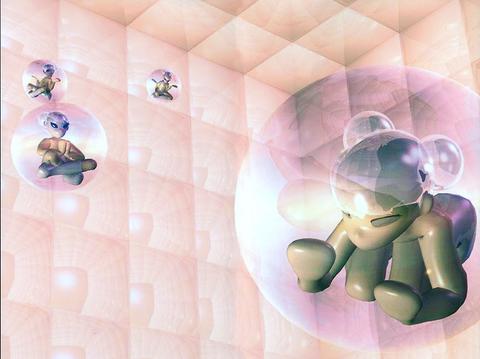Among Taiwan's generation-X artists, Hong Tung-lu (洪東祿) has enjoyed quite a star status despite his intention to keep low-key about his life and works. His fame mainly comes from his sensitivity for and the ability to create something every gen X-er can relate to, such as his Mazinger-Z series. In Nirvana (涅槃), his current exhibition at the Taipei Fine Arts Museum, he explores cyperspace and the feeling of "Nirvana" brought about by electronic media.
Hong spent his childhood in the countryside of Changhua, where his family ran a textile factory. During the industry's heyday in Taiwan, he grew up amid textiles of bright primary colors and tacky flower patterns. His family moved to Wanhua, the old-time commercial center of Taipei, in his high school years. There, Taoist temples occupied as large a quarter as brothels and dingy street markets abutted historical sites. The young Hong witnessed the most exquisite as well as the rawest side of Taiwanese culture.

Since 1996, Hong has been featured in several major exhibitions here and abroad, including the Venice Biennial in 1999 and Taipei Biennials in 1996 and 2000. He's best known for near-life-size duratrans prints on light-boxes in which popular icons, such as female characters from Japanese animations Sailor Moon and Evangelion are superimposed on Catholic images.

PHOTO COURTESY OF TFAM
In these works, the collage of symbols of different cultures had given rise to much discussion in the international art circle while the unique aesthetics of Hong's works were viewed here as quintessentially Taiwanese.
A later series shows an female action-figure firing her gun while Manhattan skyscrapers in the background are being bombed. It was created, quite ironically, just a few months before the Sept. 11 attack on New York last year.
Hong was studying there at the time of the incident and he was forced to cancel his scheduled exhibition. The shock led to the change of style apparent in Nirvana. His characteristic color scheme largely of restless primary colors has been replaced by warm pastels. "Witnessing September 11 shocked me out of the wild and harsh colors I used when I was younger. It quieted me down. Now I would rather be low-key [in my works]," Hong said.
The exhibition includes three flash animations, all titled Nirvana and starring Asian-looking "Alien dolls." Against the electronic music composed by Lin Chiang, the popular singer-turned-DJ in Taiwan's club scene, these asexual alien dolls act out their psychedelic journey in their capsuled universe -- the cyberspace.
The alien dolls, some meditating inside floating bubbles while others run in an endless tube, seem less lively than the action figures in Hong's previous works. Rather, they exude a self-contained euphoria that is out of this world. Is this a picture of Hong's near-Nirvana experience? "It's indescribable. Nirvana is too private an experience to talk about," Hong said, encouraging viewers to reflect on their own near-Nirvana experience. Some may experience it roaming in cyberspace, Hong said, while some others find it in electronic music. "With images and music, one can enter the elated state. That's the true happiness," he said.
What:Nirvana -- Hong Tung-lu solo exhibition
Where:Taipei Fine Arts Museum
When:Through Oct. 6

Behind a car repair business on a nondescript Thai street are the cherished pets of a rising TikTok animal influencer: two lions and a 200-kilogram lion-tiger hybrid called “Big George.” Lion ownership is legal in Thailand, and Tharnuwarht Plengkemratch is an enthusiastic advocate, posting updates on his feline companions to nearly three million followers. “They’re playful and affectionate, just like dogs or cats,” he said from inside their cage complex at his home in the northern city of Chiang Mai. Thailand’s captive lion population has exploded in recent years, with nearly 500 registered in zoos, breeding farms, petting cafes and homes. Experts warn the

No one saw it coming. Everyone — including the Chinese Nationalist Party (KMT) — expected at least some of the recall campaigns against 24 of its lawmakers and Hsinchu Mayor Ann Kao (高虹安) to succeed. Underground gamblers reportedly expected between five and eight lawmakers to lose their jobs. All of this analysis made sense, but contained a fatal flaw. The record of the recall campaigns, the collapse of the KMT-led recalls, and polling data all pointed to enthusiastic high turnout in support of the recall campaigns, and that those against the recalls were unenthusiastic and far less likely to vote. That

The unexpected collapse of the recall campaigns is being viewed through many lenses, most of them skewed and self-absorbed. The international media unsurprisingly focuses on what they perceive as the message that Taiwanese voters were sending in the failure of the mass recall, especially to China, the US and to friendly Western nations. This made some sense prior to early last month. One of the main arguments used by recall campaigners for recalling Chinese Nationalist Party (KMT) lawmakers was that they were too pro-China, and by extension not to be trusted with defending the nation. Also by extension, that argument could be

Aug. 4 to Aug. 10 When Coca-Cola finally pushed its way into Taiwan’s market in 1968, it allegedly vowed to wipe out its major domestic rival Hey Song within five years. But Hey Song, which began as a manual operation in a family cow shed in 1925, had proven its resilience, surviving numerous setbacks — including the loss of autonomy and nearly all its assets due to the Japanese colonial government’s wartime economic policy. By the 1960s, Hey Song had risen to the top of Taiwan’s beverage industry. This success was driven not only by president Chang Wen-chi’s